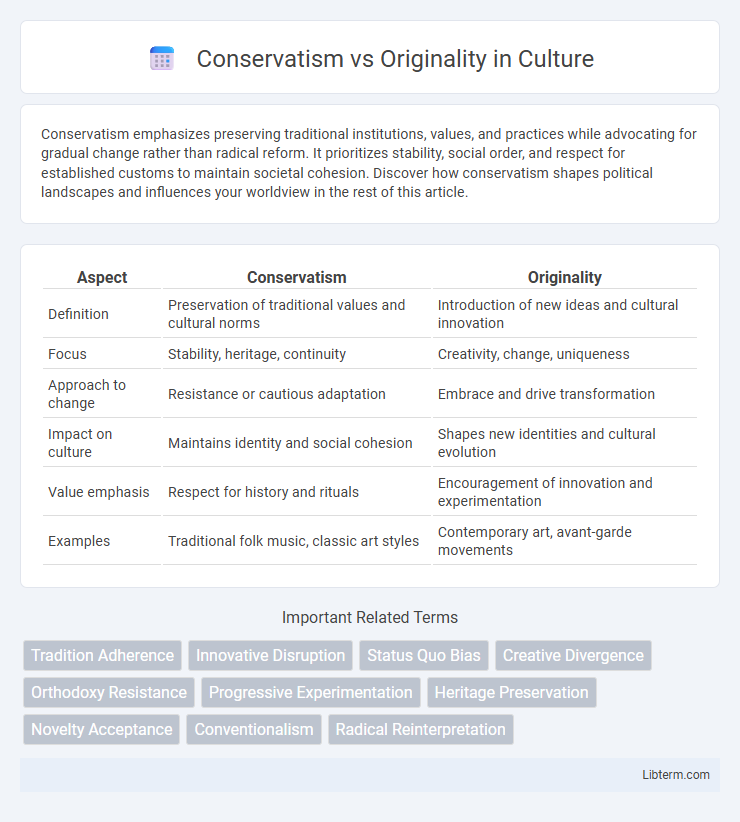Conservatism emphasizes preserving traditional institutions, values, and practices while advocating for gradual change rather than radical reform. It prioritizes stability, social order, and respect for established customs to maintain societal cohesion. Discover how conservatism shapes political landscapes and influences your worldview in the rest of this article.
Table of Comparison
| Aspect | Conservatism | Originality |
|---|---|---|
| Definition | Preservation of traditional values and cultural norms | Introduction of new ideas and cultural innovation |
| Focus | Stability, heritage, continuity | Creativity, change, uniqueness |
| Approach to change | Resistance or cautious adaptation | Embrace and drive transformation |
| Impact on culture | Maintains identity and social cohesion | Shapes new identities and cultural evolution |
| Value emphasis | Respect for history and rituals | Encouragement of innovation and experimentation |
| Examples | Traditional folk music, classic art styles | Contemporary art, avant-garde movements |
Defining Conservatism and Originality
Conservatism emphasizes preserving traditional values, established norms, and proven practices to maintain social stability and continuity. Originality involves introducing novel ideas, creative expressions, and innovative approaches that challenge conventional thinking and promote progress. Defining conservatism centers on upholding heritage and resisting radical change, while defining originality prioritizes uniqueness and the pursuit of new paradigms.
Historical Roots of Conservatism
Conservatism traces its historical roots to the reaction against the French Revolution's radical social changes, emphasizing the preservation of traditional institutions like monarchy, religion, and established social hierarchies. Thinkers such as Edmund Burke advocated for cautious reform, prioritizing evolutionary change over revolutionary upheaval to maintain social order and continuity. This historical foundation highlights conservatism's core principle of valuing long-standing cultural and political traditions as a stabilizing force in society.
Evolution of Original Thought
The evolution of original thought thrives on balancing conservatism's respect for established knowledge with innovative ideas that challenge norms. Conservatism preserves foundational concepts, providing a stable framework from which creativity can emerge and evolve. Originality drives progress by introducing novel perspectives, ensuring intellectual growth adapts to changing cultural and technological landscapes.
The Value of Tradition
The value of tradition in conservatism emphasizes preserving established customs, cultural heritage, and social institutions that have withstood the test of time. Conservatism argues that these time-honored practices provide societal stability, continuity, and a sense of identity that originality alone cannot guarantee. This perspective views innovation as potentially disruptive, favoring gradual change rooted in historical wisdom rather than radical originality.
Innovation: Challenging the Status Quo
Innovation thrives by challenging the status quo through originality that disrupts conservative norms entrenched in tradition. Embracing cutting-edge technologies and novel ideas fosters breakthroughs that conservative approaches often overlook or resist. This dynamic tension between conservatism and originality fuels transformative progress across industries and cultural paradigms.
Cultural Perspectives on Change
Conservatism prioritizes preserving established cultural norms and traditions as a way to maintain social stability and identity, emphasizing continuity across generations. Originality challenges existing frameworks by encouraging innovation and novel ideas, often resulting in cultural shifts and the reevaluation of founding values. Cultural perspectives on change reveal a dynamic tension between these forces, where societies balance respect for heritage with the need to adapt to evolving circumstances.
Balancing Stability and Creativity
Balancing stability and creativity requires integrating conservatism's emphasis on tradition and proven methods with originality's drive for innovation and fresh ideas. By valuing established frameworks while encouraging experimentation, organizations can foster an environment where reliable processes coexist with dynamic problem-solving. This synergy enhances adaptability, enabling sustained growth without sacrificing core values or creative potential.
Conservatism in Modern Society
Conservatism in modern society emphasizes preserving traditional values, institutions, and cultural norms to maintain social stability and continuity. It advocates cautious change and upholds established practices in politics, religion, and family structures as means to resist rapid or radical shifts. This approach often contrasts with originality, which seeks innovation and challenges conventional boundaries.
Originality in Art, Science, and Technology
Originality in art, science, and technology drives innovation by challenging traditional norms and introducing novel concepts that reshape cultural and intellectual landscapes. Artistic originality redefines aesthetics and expression through unique perspectives and unconventional techniques, while scientific originality fosters groundbreaking discoveries that expand human knowledge. Technological originality accelerates progress by creating cutting-edge tools and systems that transform industries and improve quality of life.
The Future: Harmonizing Conservatism and Originality
Balancing conservatism and originality shapes innovative yet sustainable futures by preserving core values while embracing groundbreaking ideas. Integrating traditional wisdom with creative solutions drives progress that respects cultural heritage and adapts to emerging challenges. This harmonization fosters resilient societies where innovation thrives without forsaking stability or identity.
Conservatism Infographic

 libterm.com
libterm.com